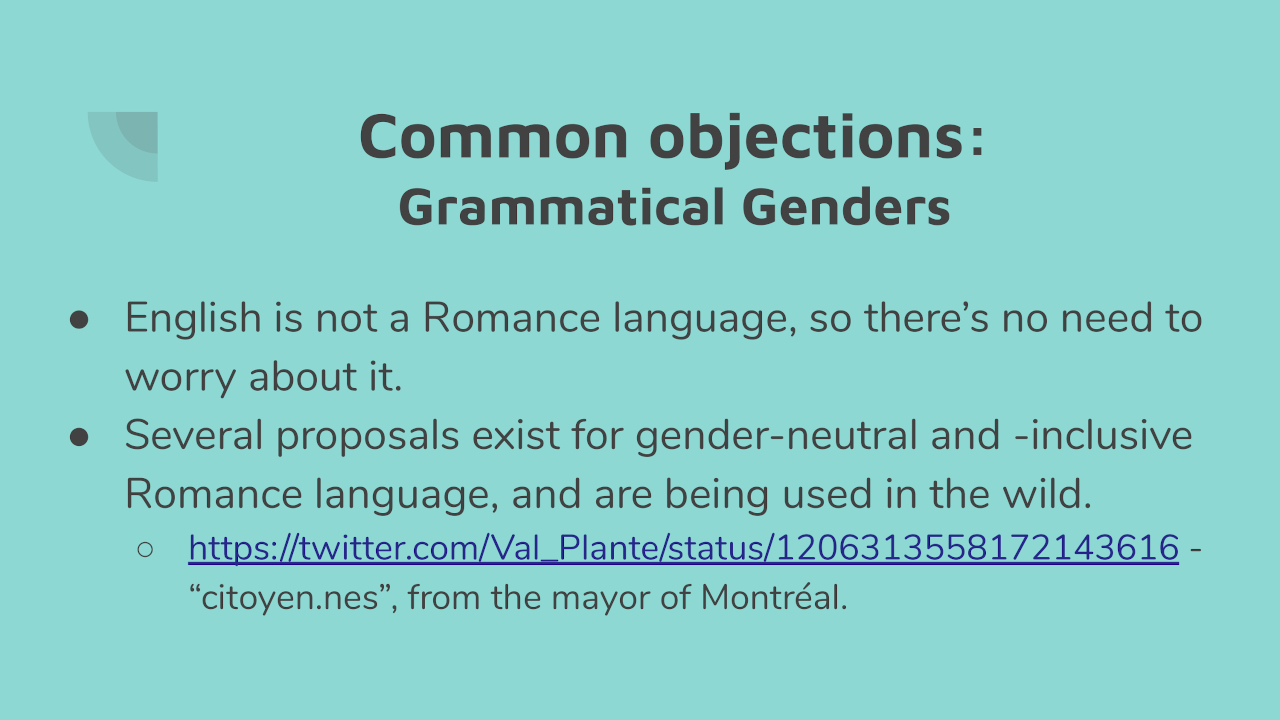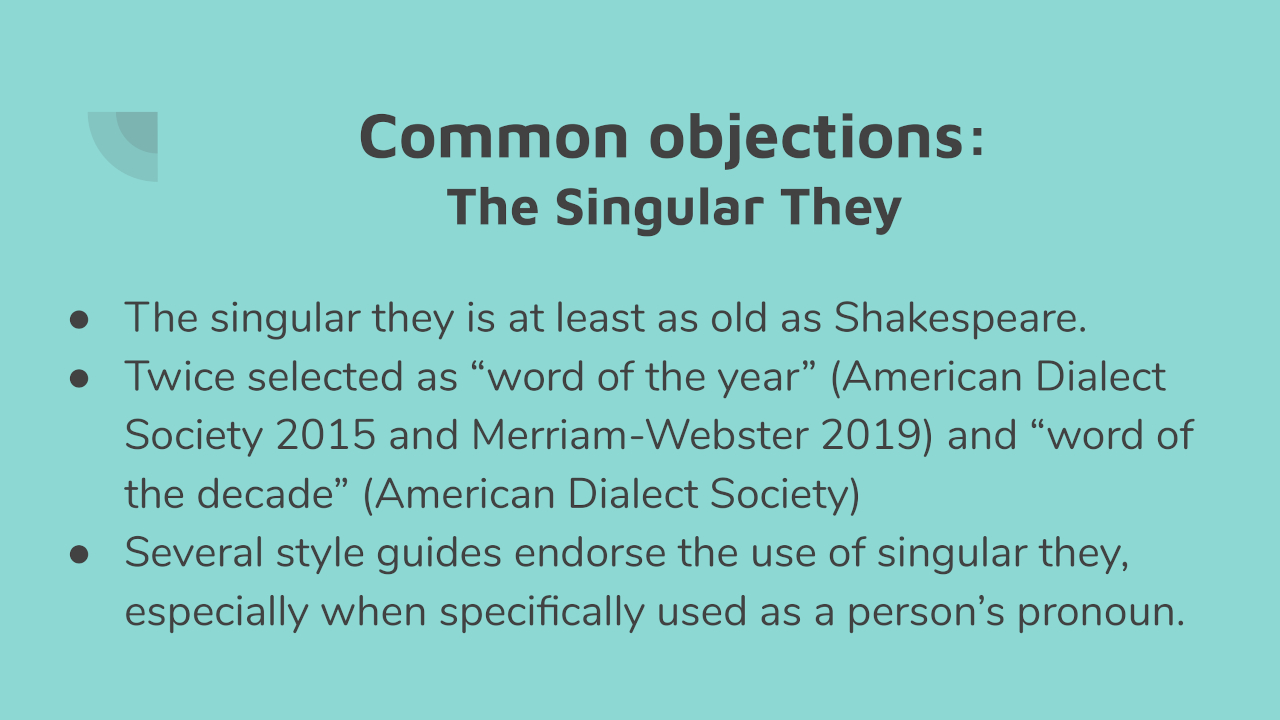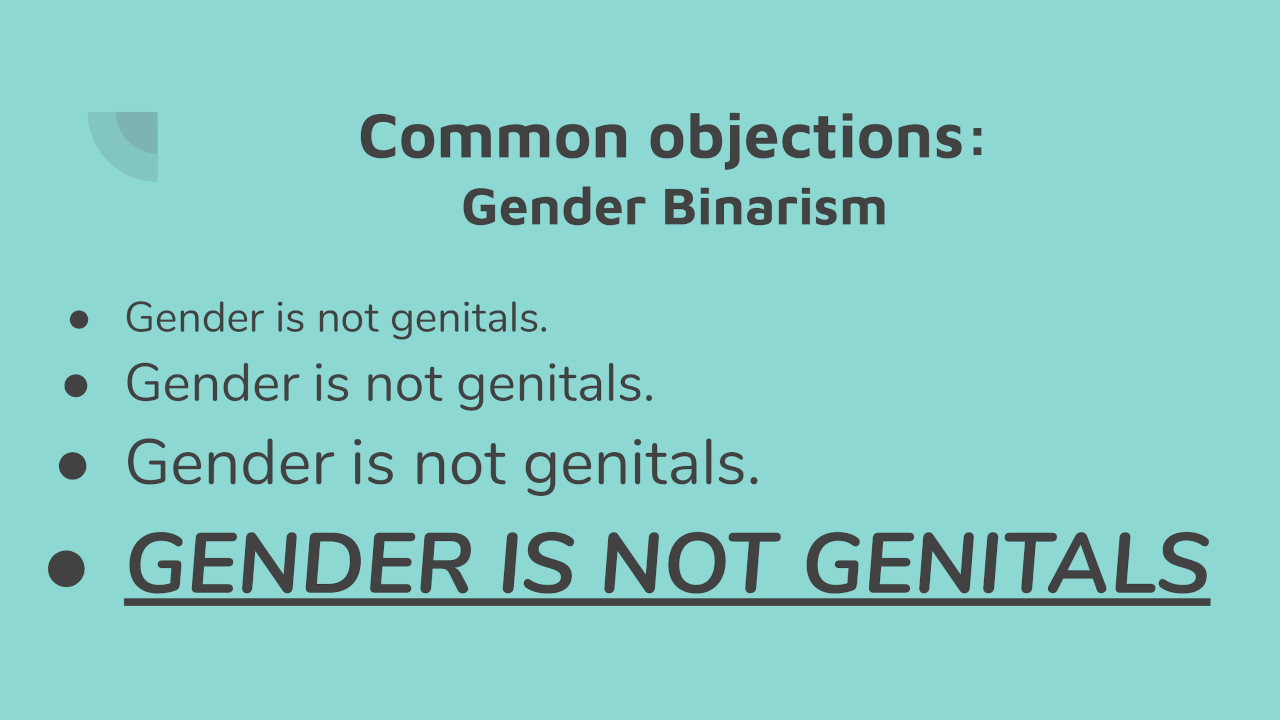While it would be nice if everyone aaccepted the correct use of pronouns (and that a person's pronouns are what they say they are), there's usually a few hurdles and objections that need to be overcome before someone is fully on board with the idea.

Other languages, usually Romance languages (derived primarily from Latin - Romance in this case refers to Rome, not love) have a concept called a grammatical gender, which can be one of the most annoying things about trying to learn a Romance language if English is your first language. All things in Romance languages with grammatical genders have a gender. Forks are masculine, spoons are feminine, that sort of thing. In a language where everything is gendered, and there are only two genders, so the objection goes, it's not linguistically possible to refer to someone without gendering them. (And, somehow, that means that people who are non-binary or agender can't exist, because there's no linguistic capacity to acknowledge them.)
Good news, English speakers: English is not a Romance language, and it does not contain grammatical genders. So, English is perfectly capable of referring to agender, non-binary, or any other gender identity through the use of pronouns without causing a language crisis.
Even in Romance languages, there are efforts underway to make those languages more gender-neutral and gender-inclusive in the way they refer to others. French, for example, has people suggesting the use of "iel" (a combination of "il", the masculine pronoun, and "elle", the feminine pronoun) as a pronoun to use when referring to someone who is non-binary, and the mayor of Montréal (at the time of the Tweet) demonstrated an inclusive dot construction, "citoyen.nes", which includs "citoyens" (the masculine plural used to also refer to any group of more than one gender) and "citoyennes", (the feminine plural that refers to groups composed solely of women) together, the dot linking them together so that it sounds like the mayor said both words together, inclusively. Even in places that have only had two genders, there's work afoot to try and overcome those limitations and present a more accurate representation of the world.

Some of the biggest uproar in English-speaking countries is the use of the singular "they". "They" as a pronoun is most commonly used to refer to a group of people, regardless of their gender identities. Since "they" does not express a gender in usage, people who are not men or women have adopted "they" as a possible pronoun to use to refer to themselves. (Like the person presenting this to you does.) Certain self-styled grammar experts and style guide writers proclaim that using "they" in such a way is impossible, and that "they" is always and forever a plural pronoun, no exceptions.
This is silly. (And several other possible adjectives that can get used when not speaking in public.) The use of "they" as a singular is at least as old as Shakespeare, noted conservative with regard to language and the creation of neologisms.
Furthermore, English as a language already has a situation where one pronoun has come to refer to both a singular and a plural. After English lost the T-V distinction between the informal second person (thee/thou/thine) and the formal second person (ye/you/yours), the pronoun "you" now refers to both singular and plural second person address. How do you tell the difference? Well, at least some of the dialects of English have adopted a different second person plural pronoun, like "y'all" (or the phrase "all y'all", where "y'all" has taken the spot "thee" held as the informal second person pronoun,) "yinz," and "youse."
As you can see, the English language continues to evolve with usage, and since "you" already occupies the same sort of space a person would use a singular "they" for, it seems logical that singular "they" should work equally as well as "you" already is.
The singular they has also been selected twice as a Word of the Year, (2015 - American Dialect Society, and 2019 - Merriam-Webster) even if that suggests more about how much talking there's been around the use of a singular they, and as the word of the decade of the 2010s by the American Dialect Society. Several style guides, including the Associated Press style guide endorse the use of the singular they, especially in relation to they being used as someone's personal pronoun, so even formal writing seems okay with the use of the singular they.

Some people are unsatisfied at the changes in language, and the ability of people to more accurately describe themselves along Gender Identity n-space, and refuse to acknowledge anything more than two genders, each of which is tied to a specific genital configuration, without exception or nuance.
Gender is not genitals. The existence of intersex people proves this. The existence of people who have sucessfuly transitioned, both socially and medically, to their correct gender identity, proves this. It should be abundantly clear at this point that someone's genital configuration has no bearing at all on what their correct gender identity is, but the belief still persists. (Often because there's lucre or power to be gained by the unscrupulous who want to promote ideas that transgender or gender-nonconforming people are somehow morally wrong for not acting and presenting themselves in accordance with what was assigned to them, or want to paint transgender and gender-nonconforming people as threats or menaces to cisgender people, usually women or children, so as to give the people they want to lead a clear Other to fixate on and direct their hate toward.)
Acting on the belief that there are only two genders, fixed and immutable, and tied solely to genital configuration is going to lead to many acts of misgendering and aggression against others, and in many workplaces, gender identity is a protected class that will provoke disciplinary actions if discrimination or hostility can be proven to be based on someone's gender identity or expression.